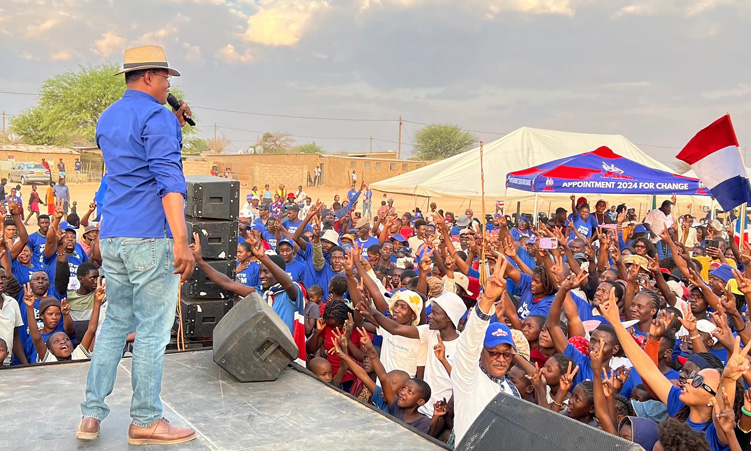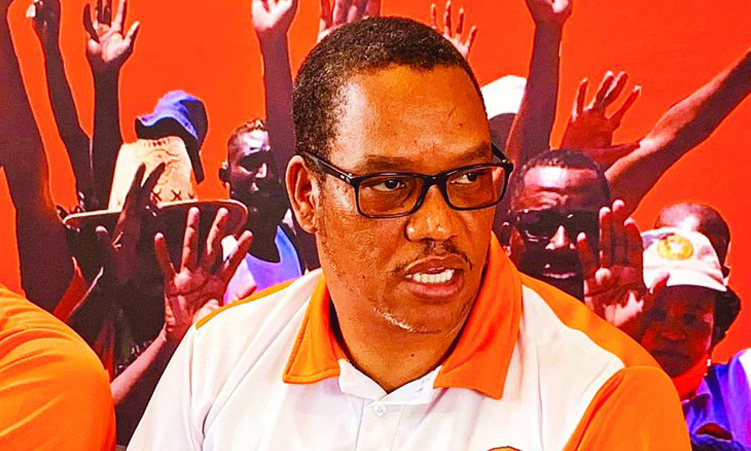The 27 November parliamentary and presidential elections are fast approaching.
There’s a lot of singing and dancing on stages, and there’s talking at the people in far-flung communities, but not much talking with them.
The politicians say they know what’s what in the country. But, do they really? They say they have a vision. But, do they really?
Let’s consider the manifestos of those who appear to be the main contenders: Swapo, the Popular Democratic Movement (PDM), the Landless People’s Movement (LPM) and the Independent Patriots for Change (IPC).

SWAPO
Swapo is all about wanting the voting public to recognise and acknowledge everything the party has done since independence in 1990, and even before.
That’s why its manifesto and campaign statements are heavy on historical information going back decades.
In her foreword to the manifesto, the party’s presidential candidate, Netumbo Nandi-Ndaitwah, engages in this backwards gazing, stating: “Despite ongoing challenges such as unemployment, income inequality and poverty, the Swapo party-led government has achieved significant gains in many sectors, including improved water infrastructure, expanded road networks, rural electrification, increased education and health facilities, enhanced social safety nets and reduced infant mortality rates among others.”
In other words, yes, there are problems, but look at everything we’ve done.
The first half of the 44-page manifesto is spent reminding us of this.The second half evokes a sense of ‘we’re going to continue doing the things we’ve been saying we’re going to do’.
There isn’t much of a vision being pitched to voters, to be honest, just more of us going along as before.
In fact, this was emphasised by the party secretary general, Sophia Shaningwa, at a recent campaign rally when she said the presumptive next president wouldn’t bring anything new, but simply continue the work of the previous Swapo presidents.
That said, Nandi-Ndaitwah does attempt to pitch us a vision in her personal manifesto, that is aptly titled ‘My Leadership Vision for Namibia’.
In this, she casts herself as “a passionate and caring leadership that is action oriented”.
She comes with a new set of principles, she says, namely, the ‘Piami’ principles that stand for pragmatism, integrity, accountability, meritocracy and inclusivity.

THE POPULAR DEMOCRATIC MOVEMENT (PDM)
Namibia is broken, and the PDM wants to fix things.
It has a list of things the ruling party has done wrong or broken, and it is offering to fix them.
The core of their message is change. It’s a somewhat optimistic message and tone, wrapped in some urgency.
Party president McHenry Venaani says: “This election is arguably the most urgent we have faced, and a vote for the PDM is a vote for a future we can all be proud of.”
But there’s an air of desperation in the party’s appeal for votes.
The desperation also shines through in how they’re dramatically, and wholly unrealistically, promising to fix deep-seated socio-economic issues, such as unemployment.
For instance, the PDM’s “top priority” will be to reduce unemployment to 11% by 2029.
This is clearly a wild swing, a promise for the sake of promising.
Despite this wild promise-making, the party basically calls on us not, to listen to any of the other parties, as “it is only the PDM that can take Namibia forward”.
There’s not much of a vision of a future Namibia that emerges from this type of message, but it is at least something of a positive message.

THE LANDLESS PEOPLE’S MOVEMENT (LPM)
The LPM wants you to know that we have many problems and that we are threatened by our condition.
Party leader Bernadus Swartbooi wants us to be mindful that the “youth’s discontent will inevitably erupt into social unrest, disorder and an escalation of the very poverty and inequality that currently plague our society” if we don’t arrest the situation.
There’s an element of fear-mongering in this message and tone, along with a sense of conflict and “struggle” gripping Namibian society.
Of course, the LPM is here to work “towards altering the trajectory of this nation for the better”.
The LPM states that its “task right now is to take over the government and form an alternative caring government for all, putting people first, restoring our people’s dignity”.
This sounds good, but once again, we don’t get a sense of the grand vision of Namibia in a future state, just a concern with the fixing of existing ills.

THE INDEPENDENT PATRIOTS FOR CHANGE (IPC)
Here’s help to help yourself.
That’s the IPC’s pitch in its manifesto titled ‘Strengthening Democracy and Building the Future: A New Vision for Namibia’.
Like something lifted from the most generic of self-help literature texts, IPC leader Panduleni Itula is quoted in the manifesto stating: “Every Namibian holds the power to create this future. Let us vote for the future we deserve, the one of opportunities, solidarity and dignity for every citizen, not for the past. Together, we can make the Namibia we dream of a reality.”
It’s certainly positive, but the message is undermined by the same wild promise-making that afflicts the other two opposition political party manifestos.
A vision of a future Namibia starts to emerge as one reads this manifesto, but it doesn’t exactly become clear.
The IPC wants you to know it is not concerned with the past, but the future.
This is clearly a dig at the ruling party and its backwards gaze.
On the whole, the manifestos leave much to be desired in tone and substance, but at least they tried, and we do get a sense of the perspectives and natures of the various parties to some extent.
Of course, it’s just words on paper.
But, that’s what we have to start with when considering who to vote for.
– Frederico Links is the editor of Namibia Fact Check. This article is an output of the Election Fact-Checking Coalition that was initiated by Namibia Fact Check and Africa Check. The Namibian is a partner in this coalition, along with various other media and civil society organisations.
Stay informed with The Namibian – your source for credible journalism. Get in-depth reporting and opinions for
only N$85 a month. Invest in journalism, invest in democracy –
Subscribe Now!










